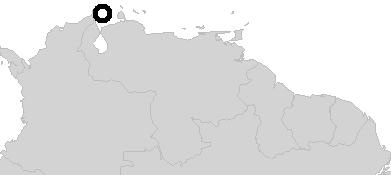
| www.CuriousTaxonomy.net |
|
The Flood in World Myth and Folklore
Northern South America |
| © 2021 Mark Isaak |

This is one version of the flood episode in the Epic of Maleiwa.
There was an old woman who was always spinning cotton. She had a lot of it in her house. A young man visited her. "How hard she must work," he thought. "I would like to marry her, but I'm afraid of the teeth in her vagina." Back then, women had teeth in their vaginas.
He visited her often. He dared not talk to her because she was old and he was young. He would have liked to take her anyway. "She could be my wife. But what could I do about those teeth?" One day as she was spinning, he crept close. He saw her teeth near the cotton she was going to weave. They were very large. He shot an arrow which hit the teeth.
The woman yelled, "You shall pay for that" and disappeared. The boy ran off and went out to sea in a small boat. The ocean spray pursued him, "Shiii! Shiii!" It was the woman's cotton. He fled, and it chased him far, covering the whole earth. Thanks to the boat he escaped.
He reached the hill called Jeepusu or Keepusu and climbed onto it. The water continued to rise. It covered everything. The young man stood with water up to his neck. Then the hill began to rise. It grew and grew, becoming a large mountain. The water could not cover it and drew back, and the earth dried. The mountain shrank and became small hill again. But the mark of the water is still visible on it, with a small boat made of stone next to it.
Johannes Wilbert and Karin Simoneau, eds., Folk Literature of the Guajiro Indians, vol. 1 (Los Angeles: UCLA Latin American Center Publications, 1986), 85-86.

Maleiwa created pairs of each living species. The animals multiplied, but the man would not mate with the woman. "I want grandchildren," Maleiwa said. Then the man had sex with the woman, and they had two children, a boy and a girl. When they grew up, the boy and girl married, not knowing they were siblings.
The Guajiro multiplied. They formed groups and began fighting and killing each other. To kill all the people who were behaving badly, Maleiwa ordered rain. The rain caused a flood which carried off all the Guajiro on earth. Maleiwa was in the sky with the animals. After several days, he sent the pigeon to find out if the earth was dry. Unable to find a perch, it returned that evening. "The earth is still covered with water," Maleiwa said. The animals cried to him for mercy. A few days later Maleiwa sent the pigeon out again. The earth was dry, and Maleiwa sent the animals back down.
Johannes Wilbert and Karin Simoneau, eds., Folk Literature of the Guajiro Indians, vol. 1 (Los Angeles: UCLA Latin American Center Publications, 1986), 123-124.
